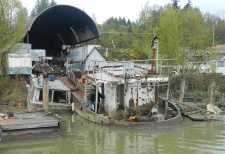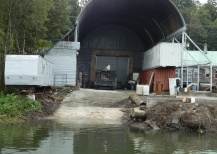Water Quality: Bellingham, Metro Vancouver
The Port of Bellingham is partnering with the Washington State Department of Ecology (DOE) in an effort to make the Bellingham Bay shoreline more fish friendly. Port Metro Vancouver on September 18 announced two initiatives to improve municipal waterways, including a five-year program to remove derelict structures and vessels from Fraser River municipalities and a planned partnership with the City of Port Moody aimed at ensuring safer, cleaner recreational boating.
Bellingham: Shoreline Project Will Create New Fish Habitat
The
Port of Bellingham is partnering with the Washington State Department of Ecology (DOE) in an effort to make the Bellingham Bay shoreline more fish friendly. The $4.1 million multiyear project that eventually will restore the estuary and eliminate a fish passage barrier to the Squalicum Creek watershed.
In October, work will begin on phase 1 of a two-phase habitat enhancement project. This $800,000 endeavor entails rebuilding fish habitat in the Squalicum Creek estuary. Derelict bulkheads, pilings and other debris will be removed and new shallow areas will be created for salmon to reproduce, feed, rest and hide from predators.
The second phase will replace the Roeder Avenue Bridge, modify the Burlington Northern/Santa Fe concrete box culvert rail bridge, replace existing sewer lines, remove a 350-foot long concrete channel bottom between the two bridges and re-establish a natural stream bed.
Earlier this month, the port was awarded an $890,000 DOE grant to support the first phase of the habitat project and to pay for a forage fish study. The port is seeking grants to support the second phase work.
Several species of salmon are listed as threatened under the Endangered Species Act and Chinook, the largest of the salmon, number less than 1.0 percent of traditional levels. Salmon recovery is a statewide priority.
The port is working with a multi-agency group that includes DOE, the Department of Fish and Wildlife, the Department of Natural Resources (DNR), and the city of Bellingham to identify and launch high-priority habitat restoration projects in Bellingham Bay. Squalicum Creek has the highest potential for productive fish habitat within the city limits. In 2007, DNR removed 1,700 tons of creosote pilings from the estuary. Further estuary improvements by the port will complement extensive up-stream restoration efforts by the city.
Port Metro Vancouver Acts to Protect and Improve Municipal Waterways
Port Metro Vancouver on September 18 announced two initiatives to improve municipal waterways, including a five-year program to remove derelict structures and vessels from Fraser River municipalities and a planned partnership with the City of Port Moody aimed at ensuring safer, cleaner recreational boating.
The Fraser River Improvement Initiative targets derelict vessels and structures that pose risk to wildlife or natural habitats, or impede navigational safety on the Fraser River, such as vessels that are sinking or leaking fuel. As part of the initiative, Port Metro Vancouver will contact owners of abandoned structures or vessels, and where possible, work with them to ensure proper removal. Port Metro Vancouver is committing approximately C$2 million over five years to the initiative. This also marks the beginning of more rigorous enforcement efforts in order to prevent the problem from reoccurring.
Gunderson Slough in Delta before (left) and after cleanup (right).
Photos/Port Metro Vancouver
"Port Metro Vancouver is proud to lead this initiative. We believe it's the kind of responsible but tough action municipalities have been looking for from the Port Authority," said Tom Corsie, PPM®, the port authority’s vice president, real estate. "Removal and disposal can be very expensive, so to ensure this program will not become a backstop for irresponsible owners, enforcement will be a critical component of its success."
The proposed initiative with the city of Port Moody, The Anchor Management Pilot Project, addresses nuisances that affect municipal waterfronts when recreational boaters drop anchor for extended periods of time without approval or appropriate marine services. It will help reduce noise from unauthorized private vessels and address concerns about improper waste disposal.
"Port Metro Vancouver holds among its highest values a commitment to keep our waterways clean and safe," said Peter Xotta, Port Metro Vancouver’s vice president of planning and operations. "Working closely with the city of Port Moody, we plan to maintain this commitment by cracking down on anyone whose actions obstruct the navigational and environmental safety of our waterways."
The program designates an area where, for a fee, boaters can safely and respectfully anchor their vessels. It also provides enforcement officials with a place to send those who drop anchor without approval. The program is expected to be in place for the start of the 2014 boating season.



